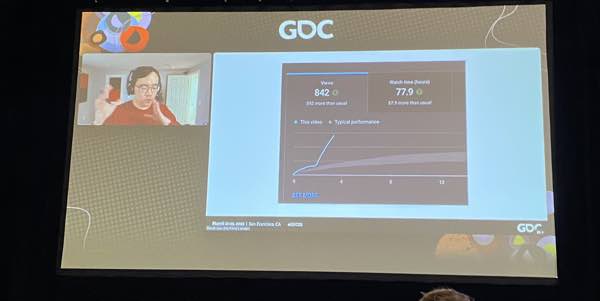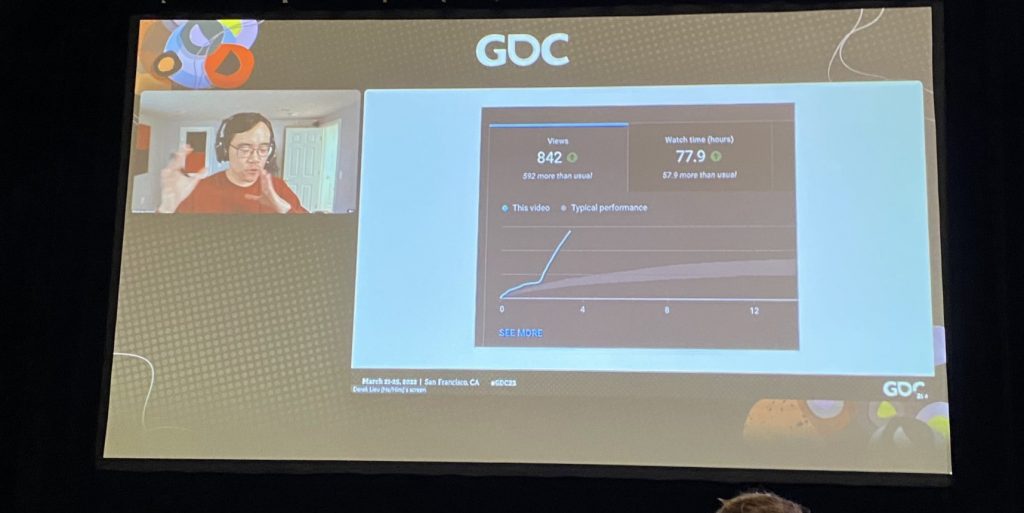
In this talk Derek Lieu and Dana Trebella ran through some of the most common fallacies they encounter when marketing games.
Fallacy: A well-made trailer will automatically get a lot of views
- False and most don’t go viral
- Same exactly trailers were posted on two spots and did wildly different. Example was Spelunky: On Nintendo’s youtube channel the video got 100,000 views. Derek Yu’s trailer posted on his youtube channel and it got 7971 views.
- Boosting it on your own social media will get it more views. See this slide where you can see in the graph the moment the developer shared the trailer on their social media.

Fallacy: The first screenshots you post about your game don’t matter that much
- If you upload screenshots you should be ready because screenshots circulate for a long time.
- The press will grab old trailers and screenshots because they find the easiest one they can.
- Basically don’t upload crap you will be haunted by later.
Fallacy: If the trailer shows everything from the game it’ll look packed with value
- You should focus on what makes your game unique in your trailer
- Don’t just clog your trailer with every single feature.
- Instead focus on the 1-3 things that really make your game unique.
Fallacy: Animated trailers are a guaranteed way to get attention
- Hades is an example of a great animated trailer but that is for very well established company
- Consider it icing on the cake to have animated trailer bits
- Don’t make animated trailers as your first asset.
Fallacy: if I show action everyone will understand it
- Trailers are fast so people can’t understand it because so much is going on. A bunch of shots can make viewers get lost in the action.
- Be cognizant of how much information is going to be retained by the audience
Fallacy: I should have a new trailer for every marketing beat
- The trailer is just a tool and the best tool might not be a trailer
Fallacy: I don’t need to show something new for every marketing beat
- It gets boring if your new trailer reuses too much from the last trailer.
- It also indicates that development is stagnant. Is there going to be anything new in the future?
Fallacy: Twitter Is a good indicator of how well my game will sell
- Twitter is good for business to business related objectives
- It indicates that it is popular among game devs.
- “This blew up on twitter so my sales will be huge!” Watch out not true!
- Instagram and Tiktok are much more consumer focused
Fallacy: I should share a release date when my game is finished but not passed cert
- Sometimes you might fail cert, sometimes your platform might have requirements. Don’t announce date until absolutely sure you passed everything.
Fallacy: My launch date doesn’t matter since I am a small indie
- Releasing on the same day as a big game like Elden Ring? You have to watch out.
- False: BECAUSE you are small, you have to have it work but if you are going up against huge announce it is gone.
Fallacy: I can rely on my own publisher to do my marketing
- Your game might not be the most focused by the publisher. Sometimes they have other things going on
- So you have to be your own best marketing
Fallacy: People loving my game at a convention means that means I will sell well
- False because people are gonig to be nice to your face
- Some games do better in person – like narrative games struggle at conventions
Fallacy: All events are created equal
- False: Consider that applying and going to these requires time and money so be strategic about what makes sense
- The events that perform best arre the ones more target to your game
- Wholesome games fest are good for narrative games.
Fallacy: Wishlists are a good indicate sales
- They give you visibility but they don’t guarantee success.
- They don’t convert as well
- Simon Carless mentioned that 7-10% converted and are trending downward
- Wishlists convert better when they are being talked about at multiple touch points.
Fallacy: Comparing my games to others is good
- Your game needs its own identity so the problem with the comparison is that they not like or know what they are referencing so they won’t like it
- Problem is they really like the other comparison game and then have high expectations for you and that might be a problem
Fallacy: Announcing a release date is not a big deal
- False it is very important
- You can get away without a trailer
- DONT skip the “announce” marketing beat
Fallacy: I don’t need to market my game until it is done
- Only Beyoncé can do that.
- Plan out your actual release date and work backwards and plan out your beats
Fallacy: I don’t need to check out my competition
- You should check out your competition
- Look back 1-2 years to look at the other games and what is working.
- Just like in sports you should watch films about how they play and what their tricks are.
Fallacy: Not including a call to action in the trailer
- Minimum “wishlist on steam”
- Join our discord, mailing list
- Have 1 at least 1
- Don’t have any fraction to finding your game
Fallacy: Not making a release date announcement trailer
- People love the announce date beat. So they know
- Pair this trailer with a story beat or a feature reveal.
Fallacy: Not reaching out to platforms
- If you are exclusive to a platform, reach out to them and ask the contact to see if you can be in a promotional effort tell them you can make a new trailer
Fallacy: not experimenting with other social platforms
- Don’t do too many.
- But experiment with others just to see if your game resonates with them.
Fallacy: Not getting email signups at events in your demo or in general
- Emails are gold, they convert better than anything else
- If you need beta testers
- Capture them at conventions too
- Offer a freebee within it
Fallacy: Not localizing your game
- Localize store page at minimum.
- Focus on the FIGS languages (French, Italian, German, Spanish).
Fallacy: Not tracking who shared interest in your game
- Anyone who shows interest
- Note what they said and liked
Fallacy: not tracking what is working
- See what people liked, ask them how would describe their game.
- What they say is helpful
Fallacy: Not play testing outside of your developer network
- Developer feedback is technical but not your target audience
Fallacy: Not charging enough
- Price indicates quality.